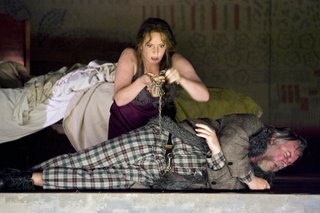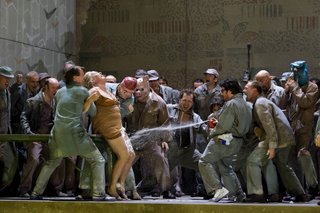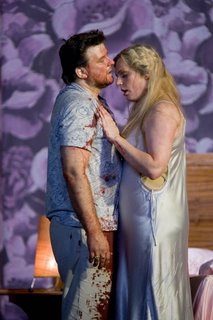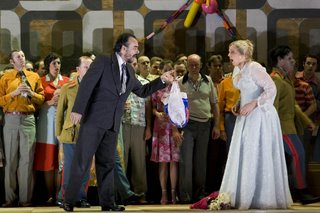Lady Macbeth of Mtsensk at Covent Garden
From Ionarts guest-critic Robert R. Reilly comes this review of London's Lady Macbeth of Mtsensk.
At Covent Garden, the Royal Opera House made a substantial contribution to the Shostakovich (1906-1975) centenary by reviving Richard Jones’s 2004 prize-winning production of Lady Macbeth of Mtsensk. It played through October 17th. At the October 13th performance, a full house thrilled to orchestral and vocal virtuosity, as well as acting of an unusually high caliber. The Orchestra of the Royal Opera House, under conductor Antonio Pappano, would have been the undisputed star of the evening had it not been for the quality of the singing from most of the principals and even those in the minor roles.
 In the pivotal role of Katerina, understudy Ann Williams-King replaced an indisposed Eva-Maria Westbroek. One can only imagine the pressure on this British soprano, who was making her ROH debut in this very difficult role at the last minute. At first, as she remained glued to the conductor’s prompts, I worried that she would be swamped by the orchestra and blown offstage by John Tomlinson’s riveting, larger-than-life portrayal of Boris, Katerina’s father-in-law. However, she grew into the role, took it over, inhabiting it so completely by the final act that even the person who booed the announcement of her substitution must have been won over. Tenor Christopher Ventris as Katerina’s lover, Sergey, was another standout. Roderick Earle’s Police Inspector and Maxim Mikhailov’s Priest were also superbly rendered.
In the pivotal role of Katerina, understudy Ann Williams-King replaced an indisposed Eva-Maria Westbroek. One can only imagine the pressure on this British soprano, who was making her ROH debut in this very difficult role at the last minute. At first, as she remained glued to the conductor’s prompts, I worried that she would be swamped by the orchestra and blown offstage by John Tomlinson’s riveting, larger-than-life portrayal of Boris, Katerina’s father-in-law. However, she grew into the role, took it over, inhabiting it so completely by the final act that even the person who booed the announcement of her substitution must have been won over. Tenor Christopher Ventris as Katerina’s lover, Sergey, was another standout. Roderick Earle’s Police Inspector and Maxim Mikhailov’s Priest were also superbly rendered.Lady Macbeth is a harrowing tale – a “tragedy-satire,” according to Shostakovich – in which the suppressed wife of a merchant murders her father-in-law with rat poison after he discovers her with her lover. She then murders her returning husband, is caught by the police, and sent to Siberia, where she commits suicide while drowning the mistress of her unfaithful lover in a lake. And Katerina is the one with whom we are supposed to sympathize. The opera has been criticized for presenting grotesque caricatures instead of human beings.
 Since opera staging today seems to require transposing the original time in which an opera is set – in this case, the 19th century – to something more modern, I was not surprised to see this 1950s setting of Lady Macbeth. I was also prepared to be irritated by it, as I often am by such transpositions, which usually reveal nothing more than the poverty of the director’s imagination. However, I caught on to what I think Jones may have been trying to achieve here and found it mostly convincing. The 50s banality somehow conformed to the brutality, the falseness, the disposability of everything.
Since opera staging today seems to require transposing the original time in which an opera is set – in this case, the 19th century – to something more modern, I was not surprised to see this 1950s setting of Lady Macbeth. I was also prepared to be irritated by it, as I often am by such transpositions, which usually reveal nothing more than the poverty of the director’s imagination. However, I caught on to what I think Jones may have been trying to achieve here and found it mostly convincing. The 50s banality somehow conformed to the brutality, the falseness, the disposability of everything.Would Shostakovich himself have set it in this era if he could have gotten away with it? Would he have shown it taking place in the Soviet Union rather than Nicolai Leskov’s short story setting of 1860s Russia? Shostakovich was involved in secret writing (should you entertain any doubts on this score, see the new Toccata Press paperback edition of Shostakovich Reconsidered), and certainly he intended the opera’s message for a Soviet audience that, by 1934, was practiced at reading between the lines of historical settings. The very fact of this acidic opera’s huge popularity during the two years it played before Stalin banned it tells us that the Soviet audiences understood.
 Shostakovich said he saw Katerina as the "tragic portrayal of the destiny of a talented, smart and outstanding woman, dying in the nightmarish atmosphere of pre-Revolutionary Russia.” Change that to: the destiny of a country, Russia, dying in the nightmarish atmosphere of the Soviet Union, and we get closer to what we are shown and hear. In 1936, it is lucky that the offended Stalin left the opera early and that all he heard was “noise instead of music,” as announced in Pravda several days later. Otherwise, had he seen it to the end, he would have probably killed Shostakovich for this subversive work.
Shostakovich said he saw Katerina as the "tragic portrayal of the destiny of a talented, smart and outstanding woman, dying in the nightmarish atmosphere of pre-Revolutionary Russia.” Change that to: the destiny of a country, Russia, dying in the nightmarish atmosphere of the Soviet Union, and we get closer to what we are shown and hear. In 1936, it is lucky that the offended Stalin left the opera early and that all he heard was “noise instead of music,” as announced in Pravda several days later. Otherwise, had he seen it to the end, he would have probably killed Shostakovich for this subversive work. It is difficult to divine what this piece means outside of the Soviet times in which it was written, but here is a try at decoding it: Lady Macbeth is an acerbic morality tale of how unhinged passion becomes if it cannot anchor itself in love. We can pretend this opera is about women’s liberation or about the stifling of a passionate spirit by the forces of provincial convention, but in any case love is denied at every turn. There is no love in Lady Macbeth – not between husband and wife, father and son, workers and boss, priest and God, or even between lovers – consider the manic musical parodies of love-making, and the hugely ironic Tristanesque music at the beginning of Scene Five sung by an impassioned Katerina to an already disinterested, loutish Sergey.
 As a consequence, this loveless society is drenched in alcohol, cupidity, and lasciviousness. Everything is coarsened; everything is false; everything is a lie. This, of course, would be true anywhere where love is so completely absent, but the Soviet Union took a particularly bizarre and surreal turn due to the total lie upon which it was based as to who and what human beings are. When reduced to this level, people do become caricatures of themselves. The deprivation of love dehumanizes. It leads to terrible things. This cruelty is what Shostakovich shows. It hurts to watch and sometimes to listen.
As a consequence, this loveless society is drenched in alcohol, cupidity, and lasciviousness. Everything is coarsened; everything is false; everything is a lie. This, of course, would be true anywhere where love is so completely absent, but the Soviet Union took a particularly bizarre and surreal turn due to the total lie upon which it was based as to who and what human beings are. When reduced to this level, people do become caricatures of themselves. The deprivation of love dehumanizes. It leads to terrible things. This cruelty is what Shostakovich shows. It hurts to watch and sometimes to listen.| Erica Jeal, Lady Macbeth of Mtsensk (The Guardian, October 3) Anna Picard, Lady Macbeth of Mtsensk (The Independent, October 8) Hugh Canning, Opera: The State They're In (The Times, October 8) De Nederlandse Opera (2006) Bolshoi (2004) Petr Weigl film (1992) |
[Program booklets are usually a waste of paper and ink, but the Royal Opera House program contained highly intelligent and stimulating reflections from opera commentators David Shengold, Rosamund Bartlett, and Prokofiev biographer David Nice. Bravo.]





















































1 comment:
"Program booklets are usually a waste of paper and ink ..."
Perhaps often at the Kennedy Center and Washingto National Opera (I can't believe that you are referring to Richard Freed's superb NSO notes, usually available in advance on-line for those with computer access to the WWW), but this usually isn't true elsewhere in the Washington, D.C. region -- or in Britain, Germany, Ukraine, Russia, Hong Kong and Singapore, and those places in Eastern Europe where I have the greatest personal knowledge and experience.
Post a Comment